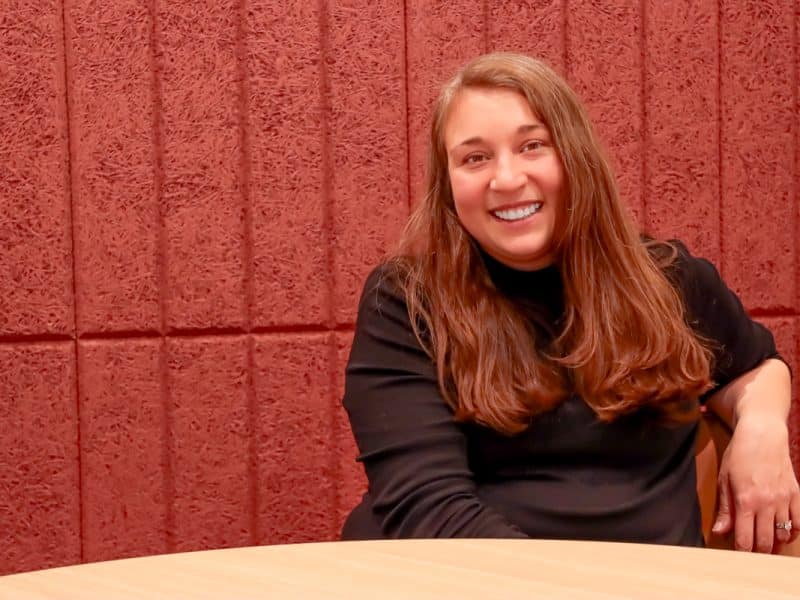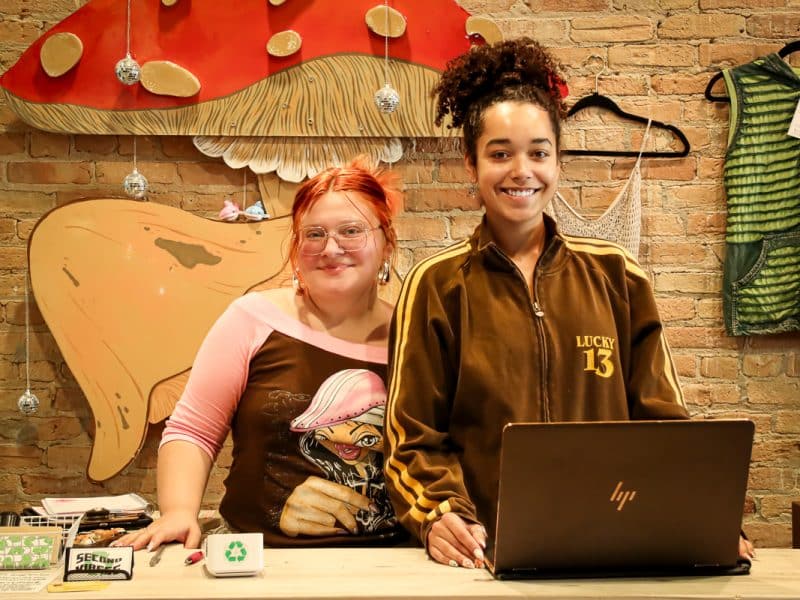For local life science entrepreneur, immigration creates a roadblock
As Michigan struggles to attract and retain talent, immigration policy plays a role in allowing entrepreneurs to live and work in The Mitten. Steven Thomas Kent profiles Dr. Stanley Samuel, who has established a Grand Rapids-based life science startup and worked to develop a new drug administration technology, even as his immigration and visa issues loom in the background.
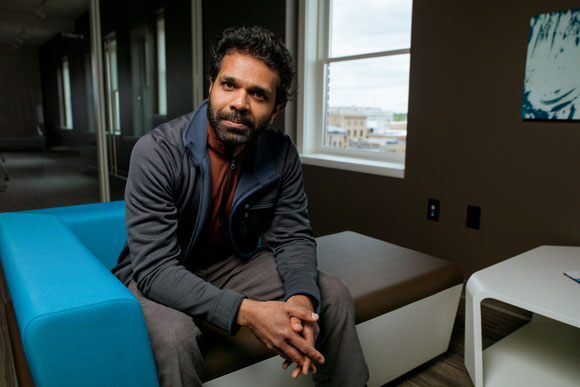
Throwing yourself into a start-up business in the life sciences field would seem like a daunting enough task for most people: You’ve got product design challenges, corporate structure complexities and IP headaches to deal with, not to mention the tightrope-walk of securing funding for your venture.
But add in immigration and visa obstacles to that recipe and it seems like an explosive cocktail — almost too much uncertainty to bear. You’d be forgiven if you thought about just throwing in the towel.
For Grand Rapids-based Dr. Stanley Samuel, immigration issues have been a part of his already-full workload since 2012, when he completed his Ph.D program and postdoctoral research in biomedical engineering at the University of Michigan. Samuel says his decision to pursue a path of entrepreneurship with the startup company he created, OcuSano, Inc., rather than the traditional path of looking for employment and visa assistance from an existing company, has undeniably made life more complicated for him.
But he also says that he would repeat it all again the same way, if given the chance.
“For me, I believe in the story [of this company],” says Samuel. “I believe in what we’re doing, and I basically risked everything. My savings, my visa status as opposed to getting a job with an established company. And I would still do it if I had to do it over again, because I’m so passionate about entrepreneurship.”
In 2012, over dinner with a physician friend and the director of a pharmaceutical research company, Samuel had an idea for a new type of sustained-release encapsulation technology for administering drugs. He soon began working on market research for such a product, and drew up a business plan for his own company that could develop and market the idea.
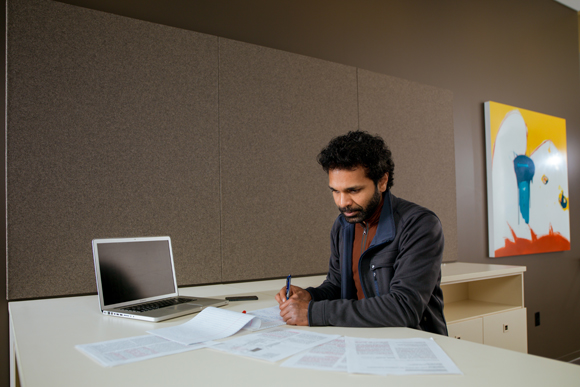
Samuel now works as the CEO of OcuSano, which employs three other people and aims to bring his drug administration technology to market. Samuel says his sustained-release innovation could provide a safer and cheaper way to administer therapeutic drugs that treat retinal disorders, cancer, chronic pain, rheumatic diseases and other chronic conditions. The technology could cut costs and minimize side effects, he says, by reducing how often patients need to receive drug doses.
But simmering away in the background are Samuel’s immigration issues, which he says can scare off potential investors from his company, and which threaten to uproot his company and erase all the infrastructure and momentum he has created here in Michigan.
Samuel, originally born in India and raised in Dubai, worked for several years with OcuSano on an H-1B work visa, using his own company to sponsor his visa application and therefore buying some time to establish himself and his business in the life science field.
However, Samuel’s H-1B visa is nearing the end of its six-year timetable, at which point he must move onto another step in establishing permanent residency, or leave the country. Samuel hired an immigration attorney to help him prepare an application for an O-1A nonimmigrant (meaning non-permanent) visa, which would grant another temporary period of residency based on a demonstration of “extraordinary ability” in the sciences.
“We built the case for [me as] someone with an extraordinary skill set of both technical and business knowledge, coming together in the entrepreneurial world,” Samuel says. “But the immigration people just didn’t seem to understand the entrepreneurial piece, and they denied the application.”
For most American citizens not well-versed in the immigration process, this begs a common-sense question: If not a postdoc biomedical engineer from the University of Michigan who runs his own startup company, then to whom exactly would we grant residency to work in the United States?
Part of the problem, says Samuel, is that the immigration guidelines aren’t designed to evaluate entrepreneurs and their business prospects when gauging “extraordinary ability.” The guidelines, he says, were established to look mostly at applicants who take the traditional routes of academia or employment at an established company.
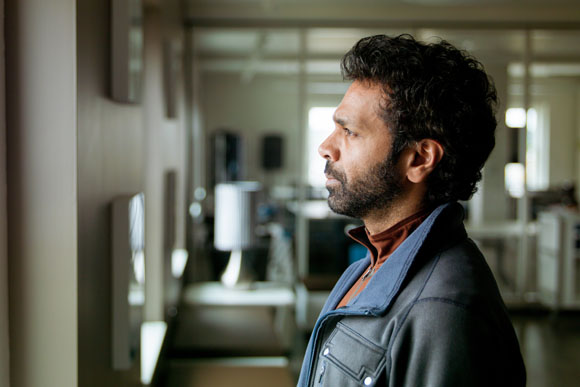
“They understand someone with specific deep expertise,” says Samuel. “So think of it like an academic, someone who has published in their specific field, and has been invited to be on panel review boards, and so on. They understand that. But when you’re someone who is taking your expertise in the technical area and then weaving in the entrepreneurial piece, they don’t know how to evaluate ‘extraordinary ability’ in that way. So I think that was our struggle and continues to be our struggle.”
Samuel and his attorney have now prepared an application for an EB-1 employment-based visa, once again trying to demonstrate “extraordinary ability” in order to grant further temporary residency. If that application, which takes about eight or nine months to receive an examination from immigration officials, fails, then Samuel says he will essentially be out of luck. He will have to pack up his local operations with OcuSano, lay off his employees and start over in another country.
There is another visa, the EB-2, which grants temporary residency based on “national interest” in the applicant’s work, Samuel notes, but the backlog of applications is so great and the processing time so long — immigration officials are just now beginning to look at EB-2 applications from the early 2000s, he says — that it would be of no use in his case.
“So there’s all this complication, and the struggle for me is, here I am with an advanced degree from a premier institution, and I actually created my own job,” says Samuel. “If I didn’t start the company the job wouldn’t exist, so it’s not like I’m taking anyone else’s job. Plus, I hired other people who are U.S. citizens to work for me. So I not only created my own job without taking anyone else’s, but created jobs for people here.”
“The flip side is,” continues Samuel, “if this application does not get approved, the people that are currently working for me, I’ll be forced to let them go. So they lose their jobs, and because I’m the inventor, the investors would want to see value created in something they’ve invested in — I’ll be forced to take this technology with me, if i’m [made] to leave the country and set up shop somewhere else. And then when my technology comes out, it will initially be applied to countries outside the U.S.”
Samuel’s attorney, Elizabeth Quinn of Maggio & Kattar, PC, in Washington, D.C., says that Dr. Samuel’s case is an unusual one, if only for the reason that he’s decided to follow his entrepreneurial spirit at all costs. Quinn, who specializes in immigration and nationality law, says that many non-citizens who aspire to become American entrepreneurs probably still take the more traditional path, putting in a few years of work with an established company to get an employer-sponsored visa before they strike out on their own.
However, Quinn says she also understands that sometimes an entrepreneur like Samuel simply has to move when the market is right and let the immigration process play out as it will.
If Samuel were not an entrepreneur, says Quinn, and were instead working for a university or a U.S. employer that can file on behalf of a foreign national, he would have likely met the visa criteria with ease.
“Instead, he co-founds his own company,” she says, “and he’s now attempting to secure a nonimmigrant visa, based on essentially the same work — except for he’s taking it out of the lab and taking it to the next level, is how I’d look at it as a lay person. And that [immigration] process I would say is not quite as friendly for the entrepreneur, and to the kinds of evidence they would be able to present.”
The U.S. Citizenship and Immigration Services section of the Department of Homeland Security recently proposed a number of rule changes and established a visa guide for entrepreneurs, and while Quinn says it’s good that the government is recognizing the need for improvement in this area, she says that the available visa options leave a number of gaps that seemingly well-qualified applicants can fall into, as Samuel’s case illustrates.
“I think it’s an encouraging sign that there’s this joint effort,” she says, “that immigration has established this entrepreneurial program to try and adapt, but it’s short of the regulatory changes needed.”
Quinn says that she hopes that the government learns to accept advice from business experts and improves its examiners’ ability to evaluate entrepreneurs and their business prospects when processing visa applications. She also thinks regulatory changes could make it easier for the spouses of H-1B visa holders to work in the United States, encouraging those visa holders to establish a household and create a family here.
Without such changes, she said, talented entrepreneurs in a number of fields will inevitably take their talents and technologies elsewhere.
“Ultimately, the U.S. loses if they make it too difficult for someone to remain here permanently,” says Quinn. “If you don’t have an employer sponsoring you because you’ve started your own company… I mean, that’s the American dream, right? It’s starting your own company.”
“[Dr. Samuel has] gotten the endorsement of people who have expertise,” she continues, “not only in life sciences but also in what it takes to get a business up and running. To take someone like that and say, ‘We’re not gonna give you that visa,’ you’re looking at him taking [his company] back home or to Canada or wherever else may be more welcoming.”
Samuel draws a similar conclusion based on his own experiences. The current immigration process for entrepreneurs, he says, simply piles another degree of risk on top of an inherently risky endeavor, and can’t help foster a culture where the United States attracts top scientists and technical professionals who want to start their own businesses and create jobs in their local economies.
“Look at it this way,” says Samuel, “you’ve got that narrow piece, a narrow slice [of the population] you find that’s willing to take a risk in entrepreneurship, regardless of immigration status. And then it’s an even narrower piece of that, that’s willing to take a risk on a venture along with a risk on immigration.”
For himself, though, Samuel doesn’t seem to resent the added workload of his immigration process. He says he’s begun to receive inquiries from students and their mentors at U of M’s Center for Entrepreneurship, asking how he’s navigated the thorny issues surrounding entrepreneurship and immigration. Samuel says he enjoys sharing what he’s learned in his business challenges and visa struggles, helping to guide these students through the complex package of technology development, corporate structure and immigration status.
“I didn’t talk about [the immigration aspect] while I was in school,” Samuel says, “but I’m having a lot of conversations since. I tell them, ‘The story at the end of it is, don’t let this immigration piece stop you if you believe there’s a strong market there.’”
For now, Samuel is working out of the GR Current offices at 234 Division Avenue in Grand Rapids, serving as an entrepreneur-in-residence and a mentor for other startups, even as he continues to move forward with OcuSano and wait for word on his immigration status. He notes that Governor Snyder’s new proposal for an influx of visas for skilled immigrants signals some hope for an easier path for future entrepreneurs, even if it’s too late to help in his case.
Most days, Samuel says, he doesn’t even discuss his immigration issues with his colleagues at GR Current, and many of the companies he works with there don’t have any idea he’s struggling to remain in the United States.
“I’m like a duck in the water,” he says, “frantically kicking its legs underneath, but you can’t even tell on the surface.”
Steven Thomas Kent is the editor at Roadbelly magazine and a high-tech, high-growth features writer at Rapid Growth Media. Stalk him on Twitter @steventkent or e-mail him at steven.t.kent@gmail.com for story tips and feedback.
Photography by Adam Bird

